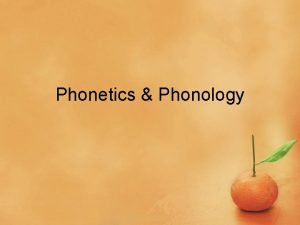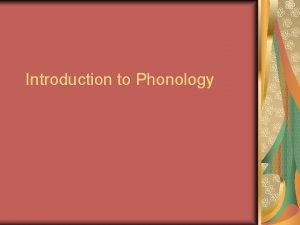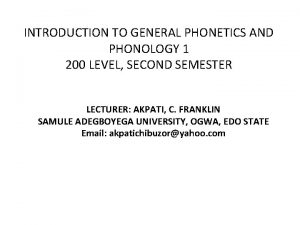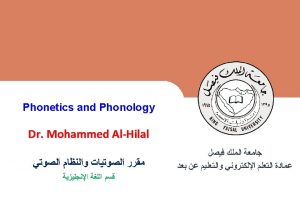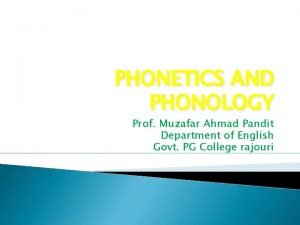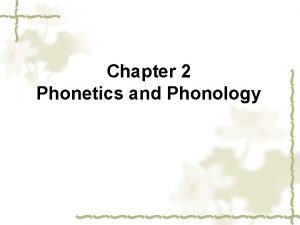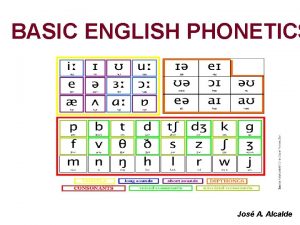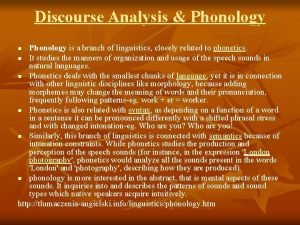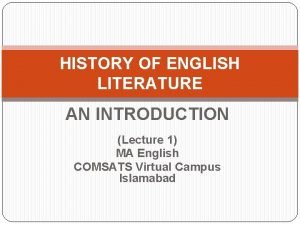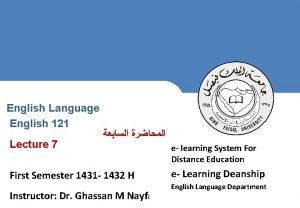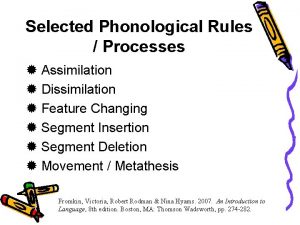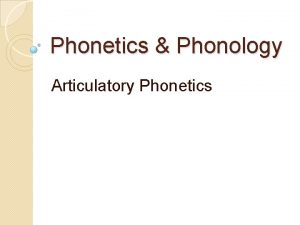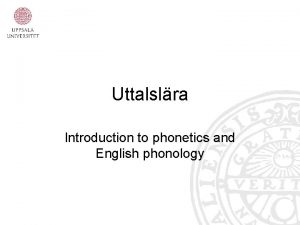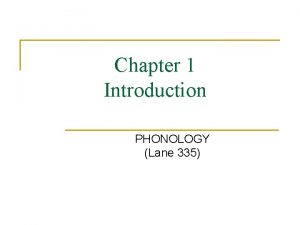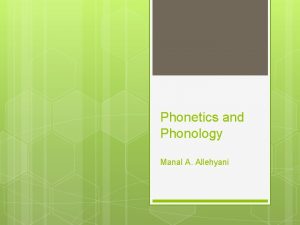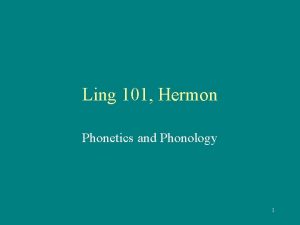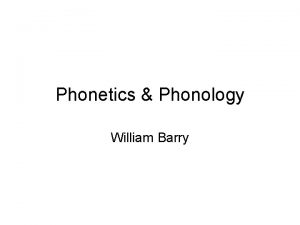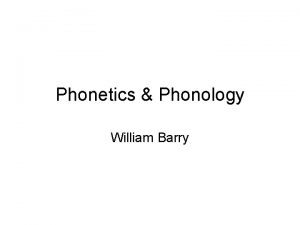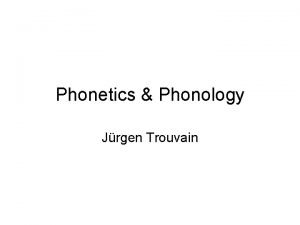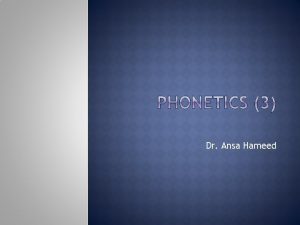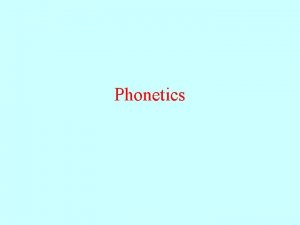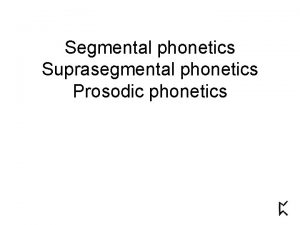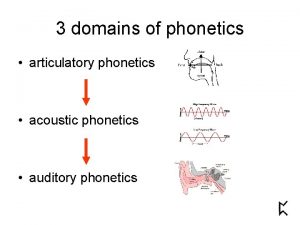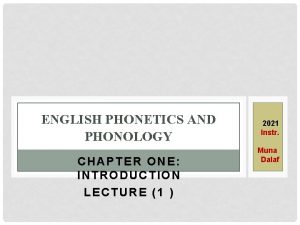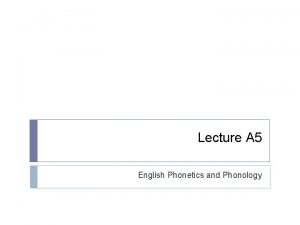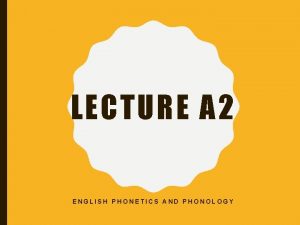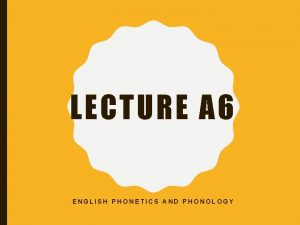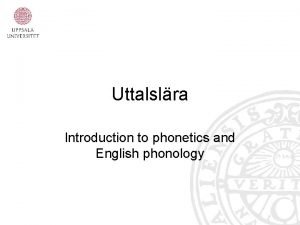Lecture A 1 English Phonetics Phonology Phonetics and



























- Slides: 27

Lecture A 1 English Phonetics & Phonology

Phonetics and Phonology • • • Phonetics? Phonology? What’s the difference? Why do we study Phonetics/Phonology? Theory VS. Practice

Phonetics? Phonology? • Phonetics… “the science of speech sound” • Phonology… “how sounds pattern and function in a given language” • Our focus… Understanding phonetics and how to apply English Phonology to improve English listening and pronunciation

Study… of sounds? ? ? • How do people make sounds? • Are these ways the same for all languages? • Why do language learners make mistakes with pronunciation? Or have challenges when listening?

Making Sounds • Remember these: • • Throat (voice)… Nose (nasal) Mouth (lips, teeth)… Tongue…

Languages • Different languages use the speech apparatus differently. • For example… ▫ If I speak Korean using tongue, mouth and nasal actions like English… it would sound strange/incorrect. ▫ The same works in reverse.

Fixing Pronunciation? • Most pronunciation problems can be fixed by correcting how we use the ‘speech apparatus’. • This is what we consider English Phonetics and Phonology “in practice”.

Discussion. • With your classmates… • Talk about your challenges in English pronunciation… • …and challenges in understanding spoken English (listening comprehension) • Be ready to share with the class

What about theory? • Before we start learning about ways to fix pronunciation, let’s talk about some of the basics in Phonetics and Phonology theory. • What is theory?

Theory is… • “a set of principles on which the practice of an activity is based” • Our activity? Phonetics and Phonology • Theory in Phonetics and Phonology will help us understand how to better study this subject.

Topic #1 • Accents and dialects in English • What is an accent? • What is a dialect? • Are they different?

Accent? Dialect? • Accents are… different ways a language is pronounced. • Dialects are ways a language differs in grammar and vocabulary. • Language variety is a combination of both of these.

Language Variety • Or… “Language Variation” • Regional variation…(where someone lives) • Social variation… (social status, age, gender, ethnicity, religion) • These are different types of language variation. There are more… but don’t worry about that now!

Discussion. • What are the different accents used in Korea? • What about dialects? • Can you share examples of regional and social variation? • Be ready to share with the class!

“Range” of Language Variation • Social variation… ▫ Working class, middle class, upper-middle class, elite • Regional (or geographical) variation… ▫ City, country-side, rich neighborhood… • The 3 “-lects” ▫ Basilects ▫ Mesolects ▫ Acrolects

Who is this?

Listen to Donald Trump. • Try to describe what his “variation” is. • Social… • Regional… • https: //www. youtube. com/watch? v=_a. Fo_BVUz. I

Let’s talk about the UK. • What makes the UK? • What does it mean to have a British accent? • “Prestige” accent • RP

Let’s hear the difference. • https: //www. youtube. com/watch? v=v 0 j. M 9 JF 3 F v. Q • From 영국남자

RP = Received Pronunciation • Also called… “The Queen’s English” • Considered the language of the educated • Prestige Accent • Not regional

Prestige Accent… • In Korea? • Famous Koreans using a prestige accent? • USA? • Where does the prestige accent come from in the USA?

RP? Northern Shift? • Also called… non-regional pronunciation • Non-regional pronunciation (NRP) ▫ “a pronunciation which cannot be pinned down to a specific area. ”

World Englishes • What type of English is taught most in Korea? • Why? • What about English students studying in Europe, Africa, India and other parts of Asia (Hong Kong, for example)?

English in the USA • “General American” (GA) (from the North) • Sometimes called… “Network American” • GA/Network American is the target English for Television, Radio and Hollywood

Other types of English? • What are some other types of English?

Many different types of English… • …but… • Standard forms are quite similar. • Of course there are differences BUT the similarities are QUITE interesting. • The most widespread form of international communication that has ever existed.

End of A 1 Lecture. • Please make sure to take notes at each lecture. • Compare your notes to the textbook to help prepare for exams.
 Articulation of phonemes
Articulation of phonemes Difference between phonetics and phonology
Difference between phonetics and phonology Questions about phonetics
Questions about phonetics Phonetics and phonology
Phonetics and phonology Rowe concise introduction to linguistics download
Rowe concise introduction to linguistics download Working memory
Working memory Phonology
Phonology Introduction to general phonetics and phonology
Introduction to general phonetics and phonology The difference between phonetics and phonology
The difference between phonetics and phonology Cardinal vowels
Cardinal vowels Phonetics and phonology
Phonetics and phonology Kæts
Kæts Phonetics vs phonology
Phonetics vs phonology Juncture examples
Juncture examples American english phonology
American english phonology 01:640:244 lecture notes - lecture 15: plat, idah, farad
01:640:244 lecture notes - lecture 15: plat, idah, farad Alcalde pronunciation
Alcalde pronunciation What is phonetics
What is phonetics Discourse analysis and phonology
Discourse analysis and phonology Segmental phonemes
Segmental phonemes English literature lecture
English literature lecture English language lecture
English language lecture Dissimilation meaning
Dissimilation meaning Contrastive distribution
Contrastive distribution Phonological processes
Phonological processes Non segmental phonology
Non segmental phonology Autosegmental phonology
Autosegmental phonology Natural classes of sounds
Natural classes of sounds



